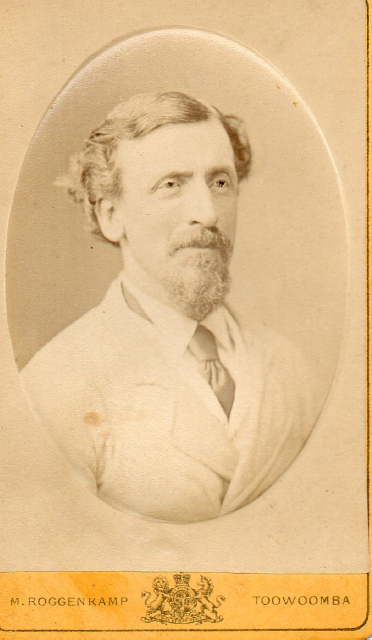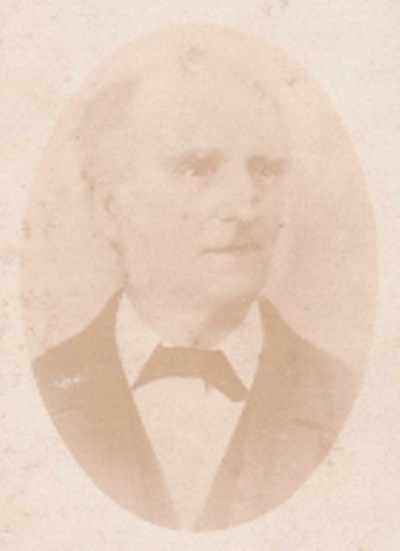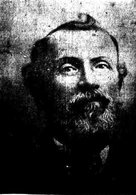Henry James Symes (1831 – 1916), born in London, was a journalist, writer, mail carrier and drover. He was baptised as James Henry Hyde but changed his name to Symes upon arriving in Australia. He also used the pen name ‘Sigma’. It is not certain when Symes came to Australia, but according to his Queensland Times obituary, he came to Queensland droving cattle in 1852. He married Sarah Dicken Thompson at Drayton on 4 May 1856. Symes died 2 February 1916 and is buried in the Toowoomba and Drayton Cemetery.
James Henry Hyde was born in London and christened in the Church of England at St Leonard’s, Shoreditch by his parents John Hyde and Sarah Marmoy on 28 September 1831. At that time or soon after, the Hydes became members of the Catholic apostolic faith who were referred to as Irvingites. There was a lot of experimenting with new forms of Christianity and John and Sarah Hyde turned away from the apostolic Catholics and converted to Mormonism. Their oldest son Henry may not have converted to Mormonism but his siblings — four or five brothers and five sisters — did. Some travelled to America, including John Hyde Jr and Joseph Edward Hyde, whose descendants live in Utah.
It is not clear how Henry James Hyde arrived in Australia. According to written reminiscences of Henry’s granddaughter Ann Dicken (Nancy) Peel, he may have sailed on a ship owned by his great-grandfather, John Hyde Snr, who ‘owned a fleet of ships that went to various countries’. The story goes that when the ship arrived in Melbourne, Henry ‘deserted and went to the goldfields at Ballarat, and then decided to go to Queensland. In the meantime, so his father would not find him, he changed his name to Symes, the name of his father’s partner’.
Another possibility is that he was the Henry James Hyde who arrived as a convict aboard the Marion in 1847. He had been sentenced at the Old Bailey to seven years’ imprisonment on 17 September 1846 for forgery.
According to his obituary, Henry Symes came to Queensland droving cattle in 1852. He married Sarah Dicken Thompson at Drayton on 4 May 1856 at the parsonage in Drayton and gave his profession as farmer. Henry named his father as John Symes, who he said was an attorney, though in the 1851 UK census John Hyde is described as a law clerk. Together Henry and Sarah Symes had twelve children.
Henry delivered the mail between Toowoomba and Callandoon (Goondiwindi) from approximately 1857 to 1868. He was famously held up by bushrangers Allwood and Irwin in 1864. They were later captured by police and tried, with Henry testifying. Both were found guilty with Irwin (alias Murray) being sentenced to ten years’ hard labour, the first year in irons, and Allwood to seven years’ hard labour on the roads. Henry’s account of this incident became his “epic” poem published in the Toowoomba Chronicle as ‘The Mailman’s Adventure or The Robbers’ Gap’ in three parts over three Saturday editions in July and August 1892.
William Henry Groom (1833 – 1901) arrived in Drayton around the same time as Henry Symes and set himself up as a storekeeper and auctioneer. In 1861, Groom became Toowoomba’s first mayor. In 1862, he was elected for the seat of Drayton and Toowoomba in the Queensland Legislative Assembly. By 1876 he was the sole proprietor of the Toowoomba Chronicle.
According to his obituary in the Queensland Times, Henry Symes was ‘one of the first secretaries to the late Hon W. H. Groom and the progressive liberal movement of the day, in the interest of the farming section of the downs. Mr Symes was a power in the political world of the time. As a journalist he was a member of the staff of the Toowoomba Chronicle for some time’.
In 1901 Groom was elected as the first Federal member for Darling Downs, being the only transported convict to ever be elected to the Australian parliament. However, he died in Melbourne on 8 August 1901 and never sat in the Australian parliament. Symes published a poetic tribute to Groom, ‘A Monody in Memory of William Henry Groom’, in the Toowoomba Chronicle.
While working on the Toowoomba Chronicle, Henry Symes would have reported on many events and issues, but it was not the practice of newspapers of the times to credit authorship of articles. The only writing attributed to ‘Sigma’ is in the form of his poems.
Symes wrote idealistically in poems such as ‘Self-Control’ (10 December 1898) and “Yes” and “No” (both 24 December 1898). He wrote lyrically in ‘A Song of Toowoomba’ (3 April 1897) and ‘The Roses of Toowoomba’ (11 October 1897), and empathetically in ‘Verses Suggested by the Latest Suicide in Toowoomba’ (26 November 1898). He showed support for Queensland’s involvement in the Boer War in support of the British cause in ‘A Patriotic Song’.
Symes lost his sight for a long period and wrote about it in ‘Blindness’ (13 September 1890). He also was forward thinking with ‘Rhymes for the Times’ (24 May 1893) and ‘Queensland’s Future’ (25 September 1897). ‘Federation – An Acrostic’ (24 June 1899) is an amusing look at the debate of that time.
Sarah Dicken Symes died of heart disease on 14 July 1900 at the family home in Hume Street, Toowoomba. Henry published a poem, ‘In Tribute’, in her memory. He spent some of the last years of his life living with his sons’ families in Crows Nest and Chinchilla, where he passed away from senile decay on 2 February 1916. He is buried in the Presbyterian section of Toowoomba and Drayton Cemetery with Sarah Dicken Symes and their eldest daughter Sarah Maria Mackay.
Note: This biography is based on research by Denis Peel, great-grandson of Henry Symes.
Citation
Denis Peel , ‘Henry James Symes (1831 – 1916)’, Harry Gentle Resource Centre, Griffith University, 2020, https://harrygentle.griffith.edu.au/life-stories/henry-james-symes-hyde/., accessed [enter date].
Newspapers
Toowoomba, Courier, 15 March 1864, p. 4.
Local Intelligence, Warwick Examiner and Times, 2 November 1867, p. 2.
The Gazette, Brisbane Courier, 14 October 1867, p. 3.
Leyburn, Darling Downs Gazette and General Advertiser , 6 November 1869, p. 3.
Advertising, Darling Downs Gazette, 9 April 1884, p. 2.
Family Notices, Warwick Examiner and Times , 12 March 1887, p. 2.
Original Poetry, Toowoomba Chronicle and Darling Downs General Advertiser , 4 January 1893, p. 2.
A Song of Toowoomba, Darling Downs Gazette, 3 April 1897, p. 4.
The Roses of Toowoomba, Toowoomba Chronicle and Darling Downs General Advertiser , 12 October 1897, p. 3.
Verses suggested by the Late Suicide in Toowoomba, Darling Downs Gazette, 26 November 1898, p. 5.
Self-Control, Toowoomba Chronicle and Darling Downs General Advertiser , 10 December 1898, p. 3.
Yes!, Darling Downs Gazette, 24 December 1898, p. 3.
A Monody in Memory of William Henry Groom, Toowoomba Chronicle and Darling Downs General Advertiser , 24 August 1901, p. 3.
The Late H. J. Symes, Darling Downs Gazette, 5 February 1916, p. 6.
Mr H. J. Symes, Queensland Times, 4 February 1916, p. 7.
In Tribute, Toowoomba Chronicle and Darling Downs General Advertiser , 11 August 1900, p. 3.
Online Resources
Births, Deaths & Marriages Queensland, marriage registration, 1859/C/315
Births, Deaths & Marriages Queensland, death registration, 1916/C/385
Find a Grave - Henry James Symes
Harry Gentle Resource Centre: Sarah Dicken Symes (née Thompson)
Harry Gentle Resource Centre Dictionary of Biography, 'Henry Symes (1831-1916)'





